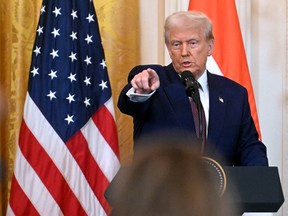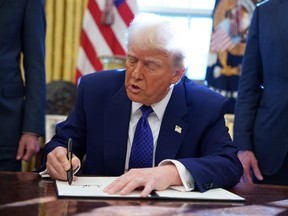The move allows the U.S. to propose new levies on a country-by-country basis
Article content
United States President Donald Trump announced Thursday reciprocal tariffs against some of its biggest trading partners, including Canada.
Article content
Article content
While details of the tariffs remain scarce, the move allows the U.S. Trade Representative and Commerce secretary to propose new levies on a country-by-country basis as the U.S. aims to rebalance what it considers unfair trade relations.
Advertisement 2
Article content
Howard Lutnick, Trump’s nominee to lead the U.S. Commerce Department, said studies to determine trade imbalances should be complete by April and tariffs could start immediately after.
Read the official announcement below:
Today, President Donald J. Trump signed a Presidential Memorandum ordering the development of a comprehensive plan for restoring fairness in U.S. trade relationships and countering non-reciprocal trading arrangements.
- The “Fair and Reciprocal Plan” will seek to correct longstanding imbalances in international trade and ensure fairness across the board.
- Gone are the days of America being taken advantage of: this plan will put the American worker first, improve our competitiveness in every area of industry, reduce our trade deficit, and bolster our economic and national security.
The United States is one of the most open economies in the world, yet our trading partners keep their markets closed to our exports. This lack of reciprocity is unfair and contributes to our large and persistent annual trade deficit.
There are endless examples where our trading partners do not give the United States reciprocal treatment.
Article content
Advertisement 3
Article content
- The U.S. tariff on ethanol is a mere 2.5 per cent. Yet Brazil charges the U.S. ethanol exports a tariff of 18 per cent. As a result, in 2024, the U.S. imported over US$200 million in ethanol from Brazil while the U.S. exported only US$52 million in ethanol to Brazil.
- The U.S. average applied Most Favored Nation (MFN) tariff on agricultural goods is five per cent. But India’s average applied MFN tariff is 39 per cent. India also charges a 100 per cent tariff on U.S. motorcycles, while we only charge a 2.4 per cent tariff on Indian motorcycles.
- The European Union can export all the shellfish it wants to America. But the EU bans shellfish exports from 48 of our states, despite committing in 2020 to expedite approvals for shellfish exports. As a result, in 2023, the U.S. imported US$274 million in shellfish from the EU but exported only US$38 million.
- The EU also imposes a 10 per cent tariff on imported cars. Yet the U.S. only imposes a 2.5 per cent tariff.
- A 2019 report found that across 132 countries and more than 600,000 product lines, United States exporters face higher tariffs more than two-thirds of the time.
Advertisement 4
Article content
This lack of reciprocity is one source of America’s large and persistent annual trade deficit in goods: closed markets abroad reduce U.S. exports and open markets at home result in significant imports, both of which undercut American competitiveness.
- The United States has run a trade deficit of goods every year since 1975. In 2024, our trade deficit in goods exceeded US$1 trillion.
- Thanks to the proliferation of non-reciprocal barriers in just the last few years, the U.S. now runs a trade deficit in agriculture, worth around US$40 billion in 2024.
Though America has no such thing, and only America should be allowed to tax American firms, trading partners hand American companies a bill for something called a digital service tax.
- Canada and France use these taxes to each collect over US$500 million per year from American companies.
- Overall, these non-reciprocal taxes cost America’s firms over US$2 billion per year.
- Reciprocal tariffs will bring back fairness and prosperity to the distorted international trade system and stop Americans from being taken advantage of.
Advertisement 5
Article content
President Trump continues to deliver on his mandate given to him by the American People to put America First when it comes to trade.
- As President Trump said in the Presidential Memorandum on American First Trade Policy on his first day in office, trade policy is a critical component of our economic security and national security.
- In his first term, President Trump successfully ended the outdated and unfair NAFTA, replacing it with the historic USMCA to deliver one of the largest wins for American workers.
- When our national security was threatened by a global oversupply of steel and aluminum, President Trump took swift action to protect America’s national security by implementing tariffs on imports of these goods.
- In response to China’s intellectual property theft, forced technology transfer, and other unreasonable behaviour, President Trump acted with conviction to impose tariffs on imports from China, using that leverage to reach a historic bilateral economic agreement.
Just last week, President Trump leveraged tariffs to force Canada and Mexico to make long-overdue changes at our northern and southern borders, ensuring the safety and security of American citizens.
With files from Bloomberg
Article content
READ: Donald Trump’s official reciprocal tariff announcement
2025-02-14 15:14:50





